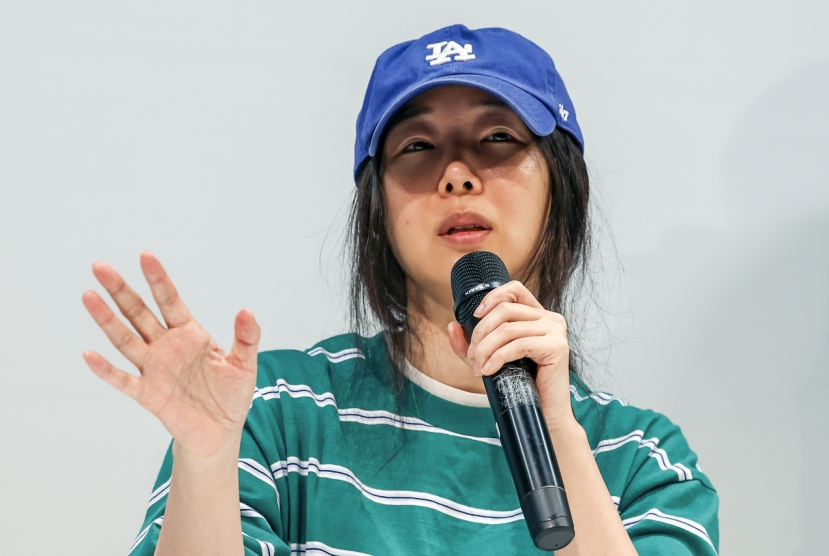[Faye Flam] Can you spot fake news? Don’t be so sure
By Lee Hyun-jooPublished : Jan. 2, 2017 - 16:14
One of the enduring mysteries of the fake-news epidemic is why it’s happening now, when it’s easier than ever for readers to fact-check stories with a few quick keystrokes. A Google search and a little common sense should be enough to cast doubt on stories that the Clintons are running a child sex ring from a pizza parlor, that Sharia law has been instituted in Florida or that CNN accidentally aired 30 minutes of pornography.
And yet, fake news was rampant in 2016. No, busloads of paid protesters didn’t descend on Texas in November, but more than 350,000 people shared “news” that they did. Made-up stories outperformed the real stuff on Facebook, with dozens of dubious websites springing up to meet the demand. Pakistan’s defense minister fell for fake news. So did America’s next national security adviser. No wonder PolitiFact named fake news its “Lie of the Year.”
It’s not that people are getting dumber, psychologists say. Humans have always had blind spots. But one in particular is causing trouble now: People are ignorant of their own ignorance. In order to realize you should look something up, you have to recognize that you don’t already know the answer.
Brown University psychology professor Steven Sloman has been investigating this tendency. In one 2013 study, he asked subjects how much they know about complex policies such as unilateral sanctions on Iran. Most people reported knowing a lot -- but when asked to explain how the policies worked, they couldn’t. Shattering what Sloman calls “the knowledge illusion” leads people to downgrade their self-assessment -- but then their overconfidence returns. More recently, Sloman has been researching the way people overestimate their understanding of everything from glue to coffee makers to toilets for his forthcoming book “The Knowledge Illusion: Why We Never Think Alone.”
Not everyone is equally self-deluded, of course. As a test, Sloman asks a simple math question: A bat costs $1 more than a ball, and together they cost $1.10. What does the ball cost? About 20 percent of people get this right, he said, and they are not as vulnerable to the knowledge illusion.
But what about content knowledge -- knowing facts about the world? You might think that would arm people against fake news, but experiments show that’s not necessarily the case. Education professor Joseph Kahne of the University of California Riverside gave young subjects, age 15 to 27, a short test for political literacy and then showed them a mix of fake and real news stories presented as Facebook posts. He found high scorers were no better than the rest at separating fake stories from evidence-based ones.
What did matter was whether a news story bolstered the subjects’ existing beliefs. “The judgments people make are heavily influenced by whether or not information aligns with a policy position they already hold,” Kahne said. People who identify as liberals have no trouble pooh-poohing the rumor that Barack Obama was born in Kenya, for example, while those on the conservative end were more likely to believe it. Likewise, liberals were more likely than conservatives to swallow a false claim that 90 percent of rich Americans pay no taxes. The results are slated to be published in American Educational Research Journal.
Kahne says the powerful influence of pre-existing political beliefs may explain why a little knowledge doesn’t shield people from being fooled. The people who know more about politics, he said, are better equipped to understand the political implications of a story, and therefore quicker to know whether it reinforces or challenges their beliefs. You have to know a little about politics to know if a given story makes liberals or conservative look bad.
And false stories are easier than ever to generate and spread. In decades past, Kahne said, people trusted established newspapers, magazines and TV news programs. But trust in the mainstream media has declined massively over the past 20 years, while a majority of Americans now get news from Facebook.
Many younger people simply read what Facebook feeds them, Kahne said. They may not pay attention to whether a story came from a legitimate news site. What’s more, they may not care if it’s true. People are no longer just consumers of news but producers and circulators, he said. Few young people in 20th century went around photocopying newspaper stories and distributing them, but millions do this on Facebook today. Spreading accurate stories isn’t necessarily rewarded with likes and shares.
Kahne, like a number of other experts, doesn’t think the answer lies in making Facebook’s executives the arbiters of truth. Better, he says, to help readers and social media users think more critically. The question is: How? One factor that makes a difference is education. In the study, Kahne asked his subjects whether they had any sort of media literacy instruction in high school. Those who were least vulnerable to fake news were most likely to have remembered teachers explaining how to evaluate news stories for credibility. Some teachers also discussed what many of us take for granted: that the difference between truth and falsehood actually matters.
As Kahne and his co-authors say in their paper: “The belief that accurate information will bolster democratic decision-making and enable societal improvement is deeply embedded in the enlightenment paradigm, pragmatist beliefs, deliberative ideals and other prominent conceptions of a strong, just, and productive democracy.”
But people aren’t born knowing this. In fact, most may not know it -- though they probably think they do.
By Faye Flam
Faye Flam is a Bloomberg View columnist. She was a staff writer for Science magazine and a columnist for the Philadelphia Inquirer. – Ed.
Bloomberg




![[Herald Interview] 'Amid aging population, Korea to invite more young professionals from overseas'](http://res.heraldm.com/phpwas/restmb_idxmake.php?idx=644&simg=/content/image/2024/04/24/20240424050844_0.jpg&u=20240424200058)











![[KH Explains] Korean shipbuilding stocks rally: Real growth or bubble?](http://res.heraldm.com/phpwas/restmb_idxmake.php?idx=652&simg=/content/image/2024/04/25/20240425050656_0.jpg&u=)

